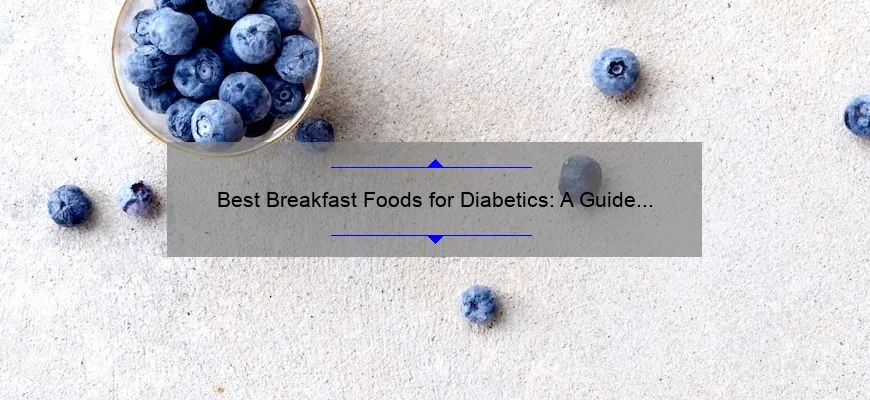Short Answer: Best Breakfast Foods for Diabetics:
Breakfast options that help manage diabetes include whole-grain cereals, low-fat dairy products, eggs, nuts, and fresh fruits. It’s important to choose foods with a low glycemic index and high fiber content to maintain stable blood sugar levels. Avoid sugary cereals, refined grains, and processed meats.
Understanding the Importance of Breakfast for Diabetics
Understanding the Importance of Breakfast for Diabetics
Breakfast is often referred to as the most important meal of the day, and this holds true for everyone, especially individuals with diabetes. Starting your day with a healthy breakfast can have numerous benefits for managing blood sugar levels and overall well-being. In this blog post, we will delve into why breakfast plays a crucial role in the daily routine of diabetics.
Managing blood sugar levels is of utmost importance for individuals living with diabetes. Skipping breakfast or consuming an unhealthy one can have negative effects on glucose control throughout the day. When you have diabetes, your body needs regular meals to maintain stable blood sugar levels. By skipping breakfast, you are essentially setting yourself up for unstable glucose levels and potential energy crashes later in the day.
Eating a balanced breakfast provides vital nutrients needed to kick-start your metabolism and keep it functioning optimally. A nutritious morning meal should include protein, whole grains, healthy fats, and fiber-rich foods. These elements work together to slow down digestion, leading to a gradual release of glucose into the bloodstream rather than causing sharp spikes in blood sugar levels.
Additionally, having a satisfying breakfast helps curb cravings and unnecessary snacking later in the day – something that diabetics need to be mindful of due to their increased risk of weight gain. By consuming a balanced meal early on, you feel fuller for longer periods and avoid mindless munching or reaching out for sugary snacks that can wreak havoc on your blood sugar control.
Furthermore, research has shown that eating breakfast can improve cognitive function and concentration – both essential factors when managing diabetes effectively. By fueling the brain with proper nutrients after an extended fasting period during sleep, mental clarity is enhanced throughout the day. This aids in making sound decisions regarding food choices while keeping track of carbohydrate intake and medication requirements.
For diabetics who are also trying to lose weight or maintain a healthy body weight, eating breakfast becomes even more crucial. Contrary to popular belief, skipping breakfast does not promote weight loss; in fact, it can have the opposite effect. When you skip a meal, especially one as important as breakfast, it often leads to overeating later in the day due to increased hunger and a slower metabolic rate. This pattern can contribute to weight gain or hinder weight loss efforts.
So how can diabetics ensure their breakfast is both healthy and satisfying? Here are some creative ideas:
1. Try a vegetable omelet made with egg whites or whole eggs for protein, plus a variety of colorful vegetables like spinach, bell peppers, and mushrooms.
2. Opt for Greek yogurt topped with berries and nuts. The combination of protein from the yogurt and fiber from the berries gives a satiety boost while maintaining stable blood sugar levels.
3. Enjoy a bowl of oatmeal made with rolled oats, almond milk, and cinnamon. Add chopped walnuts or flaxseeds for extra crunch and healthy fats.
4. Make whole grain toast topped with avocado slices and smoked salmon for a delicious twist that provides healthy fats such as omega-3 fatty acids.
Remember, finding what works best for your body may require some trial and error. Monitor your blood sugar levels after different breakfast options to see which ones work well for you personally.
In conclusion, understanding the importance of breakfast for diabetics is essential in achieving optimal glucose control throughout the day while promoting overall health and well-being. By making conscious choices about what you eat in the morning, you set yourself up for success by providing your body with nutrients needed to start off on the right foot – managing diabetes effectively. So don’t skip breakfast; fuel up wisely!
Top 5 Best Breakfast Foods for Diabetics: A Step-by-Step Guide
When it comes to managing diabetes, one of the most important meals of the day is breakfast. Starting your day with a balanced and healthy meal can help regulate blood sugar levels and provide a steady source of energy throughout the morning. But with so many options out there, it can be overwhelming to know which breakfast foods are the best for diabetics.
That’s why we’ve put together this comprehensive guide to help you navigate through the world of breakfast foods and find the top 5 choices that will fuel your day while keeping your blood sugar in check.
1. Eggs: The Perfect Protein Powerhouse
Eggs are a fantastic choice for diabetics because they are packed with protein and essential nutrients. Not only do they keep you feeling full and satisfied, but they also have almost no impact on blood sugar levels. Plus, eggs are incredibly versatile – you can scramble them, make an omelette or whip up a delicious veggie-filled frittata. They truly are nature’s perfect package of nutrition!
2. Oatmeal: A Hearty and Healthy Start
Oatmeal is another breakfast superstar for diabetics due to its high fiber content and low glycemic index. The soluble fiber found in oatmeal helps slow down digestion, preventing sudden spikes in blood sugar levels. Opt for steel-cut oats or rolled oats over instant varieties as they retain more nutrients and provide sustained energy.
3. Greek Yogurt: Creamy Delight with Blood Sugar Benefits
Greek yogurt is an excellent choice for those looking to maintain stable blood sugar levels throughout the morning. With less naturally occurring sugars compared to regular yogurt, it helps avoid unnecessary sugar spikes. Rich in protein and calcium, Greek yogurt also promotes satiety while supporting bone health.
4. Berries: Naturally Sweet Antioxidant Powerhouses
If you have a sweet tooth but want to keep your diabetes under control, turn to berries such as strawberries, blueberries, and raspberries. These low-glycemic fruits are bursting with antioxidants that not only protect against cell damage but also have minimal impact on blood sugar levels. Boost your morning bowl of oatmeal or Greek yogurt with a handful of these colorful gems for an added burst of sweetness and health benefits.
5. Avocado: Healthy Fats for Blood Sugar Balance
Contrary to popular belief, fats can be an essential part of a healthy breakfast for diabetics when chosen wisely. Enter the mighty avocado! Packed with heart-healthy monounsaturated fats, avocados can help regulate blood sugar levels and promote a feeling of fullness. Spread some creamy avocado on whole-grain toast or add slices to your omelette to kick-start your day in a deliciously nutritious way.
In conclusion, the top 5 best breakfast foods for diabetics include eggs, oatmeal, Greek yogurt, berries, and avocados. By incorporating these nutrient-dense options into your morning routine, you’ll not only satisfy your taste buds but also support balanced blood sugar levels throughout the day. Remember to always consult with a healthcare professional or registered dietitian to personalize your meal plan according to your unique needs. Start your days right and take charge of your diabetes management through the power of a wholesome breakfast!
Frequently Asked Questions about the Best Breakfast Foods for Diabetics
Welcome to our blog post where we’ll be answering frequently asked questions about the best breakfast foods for diabetics. We understand that managing diabetes can be challenging, especially when it comes to meal planning. Breakfast is an essential part of your day, and we’re here to help you make the right choices to keep your blood sugar levels in check while still enjoying a delicious morning meal.
1. Why is breakfast important for diabetics?
Breakfast plays a crucial role in providing energy for the body and kick-starting your metabolism. For diabetics, eating a healthy breakfast helps stabilize blood sugar levels throughout the day, preventing spikes or crashes that may occur due to long periods of fasting overnight.
2. What should I look for in a diabetic-friendly breakfast?
A good diabetic-friendly breakfast should include foods that are low in added sugars and carbohydrates while being rich in protein, fiber, and healthy fats. These components help slow down digestion, keep you fuller for longer, and prevent sudden spikes in blood sugar levels.
3. What are some examples of diabetic-friendly breakfast options?
There are numerous options available! Start with whole grains like oats or quinoa paired with proteins such as eggs or Greek yogurt. Adding some chopped nuts or seeds not only adds crunch but also boosts healthy fats content. You can also experiment with fruits like berries or sliced apples as natural sweeteners instead of relying on sugary syrups or spreads.
4. Can I still have my favorite cereals for breakfast if I have diabetes?
While some cereals are higher in added sugars and refined grains, there are plenty of diabetic-friendly options out there too! Look for whole-grain cereals with no added sugars or opt for hot cereals like oatmeal made from steel-cut oats or rolled oats. Check nutrition labels carefully to ensure your choice aligns with your dietary needs.
5. Are eggs a suitable option for a diabetic-friendly breakfast?
Absolutely! Eggs are an excellent choice for diabetics as they are packed with high-quality protein and healthy fats. They have little to no effect on blood sugar levels, making them a perfect addition to your morning routine. Furthermore, eggs can be prepared in various ways – boiled, scrambled, poached – to keep things exciting.
6. What about smoothies? Can I still enjoy them?
Smoothies can be both delicious and nutritious for diabetics if made carefully. Avoid using sugary fruits or sweetened yogurts as the base. Instead, opt for low-sugar fruits like berries or incorporate leafy greens and low-fat Greek yogurt or unsweetened almond milk for creaminess. Adding a source of protein like chia seeds or two tablespoons of nut butter can also provide satiety.
7. Should I completely avoid carbs at breakfast?
Carbohydrates should not be completely eliminated from your breakfast; instead, focus on choosing complex carbohydrates that digest slowly and have a minimal impact on blood sugar levels. Whole-grain bread or tortillas, brown rice cakes, or sweet potatoes are excellent alternatives to highly processed carbs like white bread or pastries.
Remember that consulting with a registered dietitian specializing in diabetes management is always beneficial to create a personalized meal plan tailored to your specific needs. With the right approach and knowledge, you can enjoy a tasty diabetic-friendly breakfast that sets you up for a successful day ahead while staying in control of your diabetes management goals!
How to Choose the Right Ingredients for a Balanced Diabetic Breakfast
Breakfast is often hailed as the most important meal of the day, and this rings especially true for individuals with diabetes. Starting your day off with a balanced diabetic breakfast can help regulate blood sugar levels, provide sustained energy, and lay the foundation for healthy eating throughout the day.
When it comes to choosing the right ingredients for a diabetic breakfast, there are a few key factors to consider: glycemic index, fiber content, protein sources, and portion control. By carefully considering these aspects and making wise ingredient selections, you can create a breakfast that keeps both your taste buds and blood sugar in check.
1. Mind the Glycemic Index:
The glycemic index (GI) measures how quickly carbohydrates in food are broken down into glucose in our bodies. Foods with a high GI value cause rapid spikes in blood sugar levels. As someone managing diabetes, it’s essential to opt for low GI foods that have a gradual impact on blood sugar. Good choices include whole grains like rolled oats or bran cereals, as well as fruits like berries or apples.
2. Amp Up the Fiber:
Fiber is vital for anyone watching their carbohydrate intake or aiming for stable blood sugar levels. High-fiber foods digest more slowly than their low-fiber counterparts, preventing sudden blood sugar surges after eating. Incorporate fiber-rich foods such as chia seeds or flaxseeds into your breakfast routine by adding them to smoothies or sprinkling them over yogurt or whole grain toast.
3. Prioritize Protein:
Protein is not only satiating but also helps slow down digestion while promoting long-lasting energy release throughout the morning. Including lean proteins like eggs, Greek yogurt (unsweetened), cottage cheese, or nut butter alongside your carbohydrates can help establish a perfect balance while keeping you feeling satisfied until lunchtime.
4. Keep Portions in Check:
Portion control plays an essential role in maintaining stable blood sugar levels throughout the day. Even if you’re choosing the right ingredients, overindulgence can still lead to blood sugar spikes. Using measuring cups or a food scale to ensure proper servings of carbohydrates and proteins, like oatmeal or yogurt, will help you stay on track with your diabetic breakfast goals.
5. Mix It Up and Get Creative:
Eating the same breakfast every day can become monotonous and potentially hinder your long-term commitment to a balanced diabetic diet. Experiment with different combinations of fruits, whole grains, proteins, and healthy fats to keep things interesting. For example, try a savory breakfast by incorporating avocado slices or smoked salmon into an omelet instead of the usual sweet toppings.
Remember that consulting with a registered dietitian who specializes in diabetes management can provide personalized guidance tailored to your unique needs. They can help you create flexible meal plans that incorporate delicious recipes while adhering to your dietary restrictions.
In conclusion, choosing the right ingredients for a balanced diabetic breakfast involves considering factors such as glycemic index, fiber content, protein sources, and portion control. By prioritizing low GI foods rich in fiber and protein while being mindful of portion sizes, you can start your day on a positive note both nutritionally and flavorfully. So go ahead – seize the opportunity to get creative in the kitchen and enjoy your wholesome diabetic breakfasts!
Quick and Easy Ideas for Diabetic-Friendly Breakfasts
Introduction:
Starting your day with a healthy breakfast is crucial for everyone, especially for individuals with diabetes. A diabetic-friendly breakfast sets the tone for the rest of the day by providing essential nutrients and keeping blood sugar levels stable. If you’re looking to kick-start your mornings on a nutritious note without compromising taste, we’ve got you covered with our selection of quick and easy ideas for diabetic-friendly breakfasts.
1. Overnight Chia Pudding:
Looking for a hassle-free breakfast that practically prepares itself? Overnight chia pudding is just what you need! Chia seeds are packed with fiber, protein, and omega-3 fatty acids that promote heart health and aid in digestion. Simply combine chia seeds with low-fat milk or unsweetened almond milk, add a touch of natural sweetener such as stevia or monk fruit, and refrigerate overnight. Wake up to a delicious and creamy pudding-like texture bursting with nutrient goodness.
2. Veggie Omelet Muffins:
Take your traditional omelet to the next level by transforming it into convenient muffin form! Start by whisking together eggs and adding colorful veggies like spinach, bell peppers, onions, and cherry tomatoes – the possibilities are endless! Bake them in a muffin tin until golden brown. These individual-sized omelets provide an excellent source of protein while delivering ample amounts of vitamins and minerals to power you through the morning.
3. Whole Grain Toast Toppers:
Don’t let the simplicity of toast fool you – there’s unlimited potential when it comes to diabetic-friendly toppings! Opt for whole wheat or multigrain bread to boost fiber content while avoiding refined carbohydrates that quickly spike blood sugar levels. Spread nut butter like almond or peanut butter on top for healthy fats or load up on protein-rich options such as smashed avocado sprinkled with fresh herbs or smoked salmon paired with cream cheese.
4. Greek Yogurt Parfait:
Greek yogurt serves as a staple in diabetic-friendly breakfasts due to its low glycemic index and high protein content. Layer it with your favorite fruits, like berries or sliced bananas, for added natural sweetness and vitamins. Enhance the texture and fiber by adding a sprinkle of unsweetened granola or crushed nuts on top. The combination of creamy yogurt and crunchy toppings is not only satisfying but also provides essential nutrients that support blood sugar control.
5. Quinoa Breakfast Bowl:
Looking to break away from traditional breakfast grains? Quinoa is an exceptional choice for individuals with diabetes due to its high protein and fiber content, making it an excellent alternative to processed cereals. Prepare quinoa according to package instructions using water or low-sodium broth instead of sugary liquids. Top it off with your choice of chopped nuts, seeds, fresh fruits, and a drizzle of natural sweeteners like honey or agave syrup for a filling and nutritious morning bowl.
Conclusion:
Diabetic-friendly breakfasts don’t have to be bland or time-consuming; with these quick and easy ideas, you can create delicious meals while keeping your blood sugar levels in check. Whether you prefer the simplicity of chia pudding or the heartiness of omelet muffins, these options provide vital nutrients that are necessary for overall health while catering specifically to individuals managing diabetes. So start each day right by fueling your body smartly and enjoy the benefits of an energizing breakfast tailored just for you!
Expert Tips and Tricks: Mastering a Healthy Morning Routine with Diabetes
Title: Expert Tips and Tricks: Mastering a Healthy Morning Routine with Diabetes
Introduction:
Living with diabetes can be challenging, especially in the morning when you’re faced with choices that can impact your blood sugar levels for the rest of the day. However, by adopting a healthy morning routine, you can set a positive tone for the day ahead. In this blog post, we will share expert tips and tricks to help you master a healthy morning routine with diabetes, enabling you to take control of your health journey.
1. Rise and Shine: Start Your Day Right
The key to a successful morning routine lies in starting your day off on the right foot. Begin by waking up at a consistent time each day to maintain stability in your body’s rhythms. This helps regulate your glucose levels throughout the day.
2. Hydrate Smartly: Kickstart Your Metabolism
After hours of fasting during sleep, it’s crucial to rehydrate your body first thing in the morning. Opt for water or unsweetened herbal tea instead of sugary beverages or fruit juices. Staying hydrated aids digestion and promotes stable blood sugar levels, giving you an energetic head start.
3. Mindful Breakfast Choices: Fuel Up Wisely
Breakfast is an opportunity to provide nourishment and kickstart your metabolism effectively if done mindfully. Focus on incorporating protein-rich foods such as eggs, Greek yogurt, or nut butter paired with complex carbohydrates like whole-grain bread or oatmeal. Avoid high-sugar cereals or pastries that can cause unhealthy spikes in blood sugar levels.
4. Get Moving: Energize Your Body
Engaging in physical activity shortly after waking up has multiple benefits for managing diabetes and overall well-being. Incorporate light exercises like gentle yoga stretches or walking for 10-15 minutes before breakfast to stimulate insulin sensitivity and promote better appetite control throughout the day.
5. Medication Management: Prioritize Your Health
If you take medication or insulin, ensure that you have a system in place to remember and take them as prescribed. Consider using pill organizers or smartphone reminders to prevent missed doses. This way, you set the foundation for maintaining stable blood sugar levels and reducing potential complications.
6. Prepare Ahead: Reduce Stress, Save Time
Mornings can be hectic, causing stress levels to rise. Minimize this by preparing things ahead of time. Pack a healthy lunch, lay out your exercise clothes, or plan your breakfast options the night before. Organizing these details alleviates decision-making stress in the morning and allows for more focus on diabetes management.
7. Keep Tabs on Glucose Levels: Monitor Regularly
Monitoring your glucose levels is vital to managing diabetes effectively. Make it a habit to check your blood sugar levels each morning before and after breakfast to understand how specific foods impact your body. This valuable feedback empowers you to make informed choices throughout the day regarding meals, snacks, and physical activities.
8. Mindfulness Practice: Find Inner Balance
Another essential aspect of a healthy morning routine is incorporating mindfulness practices such as meditation or journaling. Taking just a few minutes each day to calm your mind can reduce stress levels associated with managing diabetes and promote emotional well-being.
Conclusion:
Mastering a healthy morning routine with diabetes requires intentionality and commitment but brings tremendous rewards in terms of better blood sugar control and overall well-being throughout the day. By following these expert tips and tricks, you can start each day empowered and ready to tackle whatever challenges come your way while confidently managing your diabetes journey like a pro!






